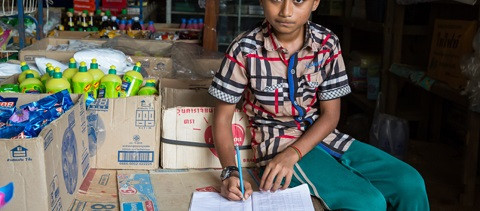
GCED Basic Search Form
Quick Search
You are here
News

Despite a relative easing of COVID-19 school closures and an increasing trend towards reopening, over one billion learners globally remain affected by school closures. Disruption to education on this scale is unprecedented. COVID-19 leaves few lives and places untouched, however its impact, including in education, is harshest for groups that are already in vulnerable situations such as refugees.
How are COVID -19 school closures affecting refugees’ education?
Even before COVID-19 refugee children were twice as likely to be out of school than other children and despite improvements in refugee enrolment rates, only 63% of refugees are in enrolled in primary school and 24% in secondary education. The pandemic risks creating a backslide in the small gains made and creating a disaster for groups such as adolescent girls.
In recent years significant efforts have been made on the inclusion of refugee learners in national education systems, however barriers to education persist and could potentially worsen due to the pandemic. There is also the worrying possibility that discrimination and xenophobia directed at refugee populations increases, negatively affecting school enrolment and retention.
What can we do a ensure quality education for refugee learners?
The first step is upholding and guaranteeing the right to education for refugees through ensuring all are able to learn at home and safely return to school. There are some promising signs that governments are fast-tracking the inclusion of refugees in their COVID-19 responses, demonstrating an opportunity to work on the delivery of commitments contained in the Global Compact on Refugees.
As the focus shifts from distance learning and school closure to reopening and returning to school, close attention must be paid to existing and exacerbated inequities facing refugees, especially secondary school age refugee girls who were already only half as likely to enroll as their male peers. These conditions are anticipated to worsen.
UNHCR estimates that 20% of the refugee girls who are in secondary school are at significant risk of never returning to school following the COVID-19 school closures. We must act now to address the inequality and dire situation facing refugee learners.
Why is this so urgent and what is at stake?
There is a lot at stake during and after COVID-19 for refugee learners. It is anticipated that there will be major increases in drop out, which means losing this generation if they are left out of education. In many countries the education status of refugees was already fragile prior to the pandemic, with many having missed years of schooling and having to work hard to catch up. They must now cope with further disruptions to their learning.
Those who were already not enrolled in education programmes are at even greater risk of never returning to learning. Lack of access to infrastructure, hardware and connectivity, living conditions and the remoteness of many refugee-hosting areas means that refugee children are also at risk of not being able to access national distance learning programmes put in place by governments as part of the COVID-19 response.
What is UNESCO doing to advance the right to education for refugees?
Through the Global Education Coalition, UNESCO is facilitating partnerships between multiple stakeholders to provide learning opportunities for children youth and adults, including refugees, who have been impacted by the disruption of education due to the pandemic.
UNESCO has pledged and is working to strengthen national education systems by providing Member States with expertise and technical guidance for policy design, implementation and planning support for the inclusion of refugees into all levels of national education systems.
UNESCO’s qualifications passport for refugees and vulnerable migrants launched in 2019 aims to facilitate learners’ integration in the education system and labour market through assessment procedures. The process helps recognize key elements such as the highest achieved qualifications, skills, relevant job experiences and language proficiency.
On 13 July from 4pm to 5:30pm CET, a high-level virtual roundtable led by UNHCR and UNESCO will bring together voices of refugees to hear about the needs and responses on the ground. The event is convened and chaired by Special Envoy Angelina Jolie and co-hosted by Canada and the United Kingdom. Watch it live here
Photo: Refugee learner doing his homework, Thailand, 2015.
- What UNESCO does in education in emergencies
- UNESCO’s education response to COVID-19
- The Global Education Coalition
- UNESCO qualifications passport for refugees and vulnerable migrants
- UNESCO’s Pledge to the Global Refugee Forum
URL:
https://en.unesco.org/news/covid-19-what-you-need-know-about-refugees-education
